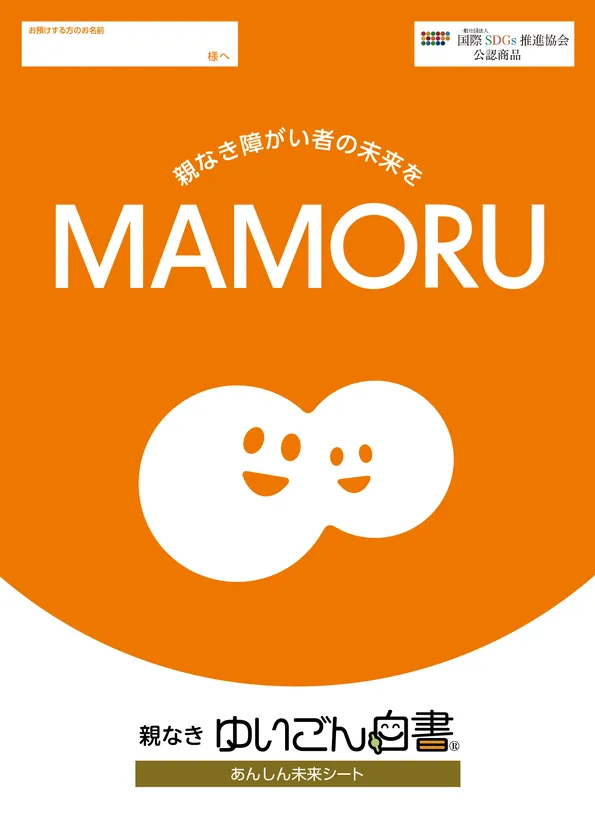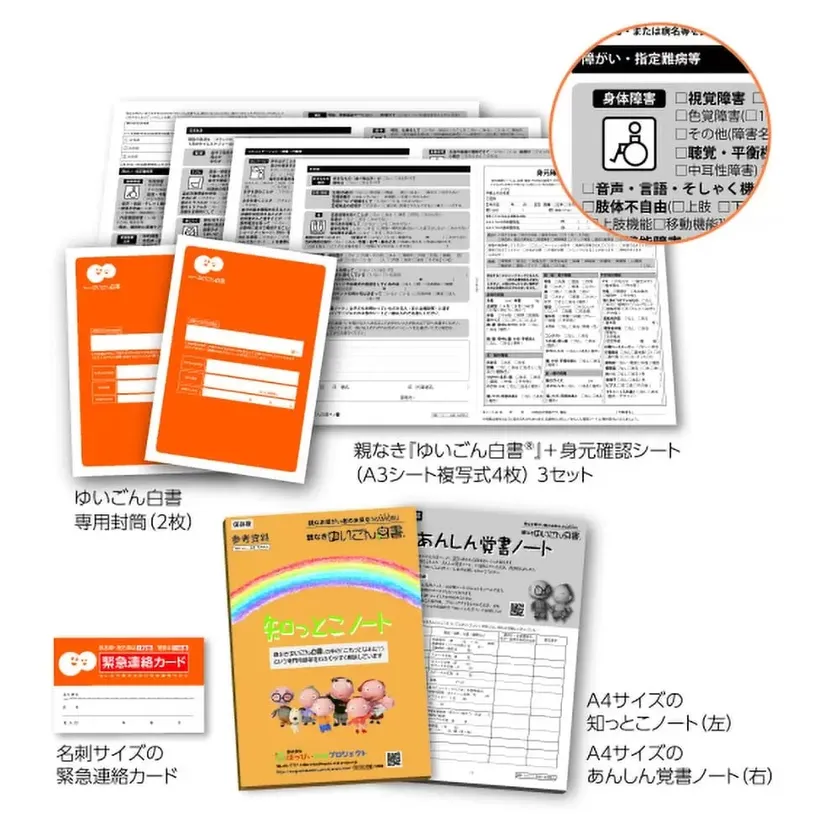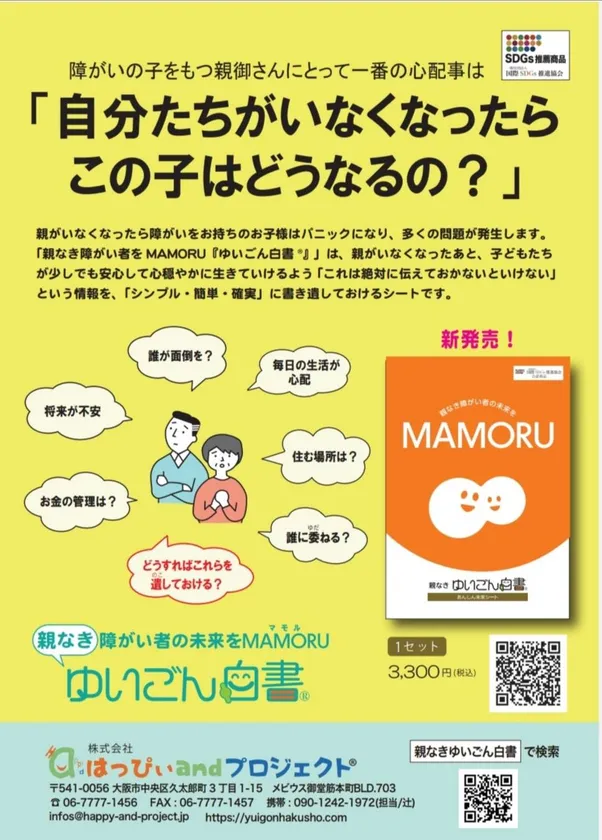A Kit to Help "After Parents" and "Care for the Elderly" for Children with Disabilities Yugon Hakusho(R)," a kit for end-of-life activities, to be released on October 17 (Thursday).
I can't die without her" - those words were the impetus for the creation of the film.
株式会社はっぴぃandプロジェクト
Happi and Project, Inc. (Head office: Chuo-ku, Osaka; Representative: Mizue Tsuji), a company that plans and sells end-of-life kits and other products, will release "MAMORU 'YUIGON White Paper(R)' for the Future of People with Disabilities without Parents" on October 17 (Thursday).

Cover of "Yui Gon White Paper(R)" without Parents
The Ministry of Health, Labor and Welfare has announced that the total number of people with disabilities is estimated to be 11.64 million (as of May 2024), and parents of children with disabilities face a serious problem: the issue of "leaving their children without parents. The "after-life problem" is a pressing concern for parents of children with disabilities: "I can't die without my child," they say, as they grow older and "aged care" becomes a social issue.
The death of a parent will surely come someday. There is a mountain of information that needs to be provided to the facilities that will be entrusted with their children, but many parents do not know how to put it all together... Many parents have this problem.
The "MAMORU 'YUIGON White Paper(R)' for the Future of Persons with Disabilities without Parents," which will be released this time, allows you to easily fill in the details of disabilities, what they can and cannot do, their habits and preferences, daily life, communication, etc. in a check mark format so that those who will take care of your child in the future will know at a glance what you want them to know. The "What Your Child Can and Cannot Do, Habits and Preferences, Daily Life, Communication, etc. can be easily filled in with check marks. In addition, the three-page duplicate form can be handed to three people, including the facility, guardian, and relatives, making this an unprecedented end-of-life kit.
In the production of this kit, we visited family associations of children with disabilities, and worked together with parents of children with disabilities and experts on post-parental leave issues. In the prototype stage, we asked 20 parents and facility personnel to serve as monitors, and based on their feedback, we made revisions and completed the kit. We have received comments from the monitored parents such as, "With this, we can unburden our shoulders while we are still in good health. We have received many inquiries even before the release of the product, and we have already received inquiries from five locations for information sessions and training sessions.
The current situation of parents with children with disabilities
In May 2024, the Ministry of Health, Labor and Welfare (MHLW) announced that the total number of persons with disabilities is estimated to be 11.64 million (approximately 4.23 million with physical disabilities, 1.268 million with intellectual disabilities, and 6.148 million with mental disabilities, including 6.1 million who hold a disability certificate). This is equivalent to about 9.3% of the total Japanese population. The breakdown of where they reside was 95.8% at home and 4.2% in institutions.
The number of people aged 20-64 with disability certificates by age group was 23.5% physical, 60.5% intellectual, and 70% mental, with a particularly high percentage of those with intellectual and mental disabilities, and their parents' generation would be in their 50s to 80s or older.
In addition, according to the "Survey on Difficulties in Living" conducted by the Ministry of Health, Labor and Welfare in 2016, 80.6% of persons with disabilities under 65 years of age live with their parents, and 65.6% of them live with their parents.
The background to the production and the road to completion (Mizue Tsuji, Representative, Happi and Project Co.
The "Yui Gon White Paper (R)" was created in 2000 after the death of my uncle who had a perfect end-of-life plan. It was in 2015 that I commercialized the project. Since then, more than 3,000 people have participated in a lecture on how to use our "Yuiigon Hakusho(R)" to create a kit for end-of-life activities, including a "family meeting" for parents of children with disabilities. One of the participants was a "family meeting" of parents with children with disabilities. These words inspired us to create the "MAMORU 'YUIGON White Paper (R)'" (親なき『YUIGON白書(R)') to help with the "issue of after-lives without parents" and "care for the aged and disabled.
It took a year and a half to complete. Since everyone has a different level of disability, age, habits, and lifestyle, we asked a variety of questions, and with the cooperation of parents with children with disabilities, specialists in the "orphan problem," and facility personnel, we had 20 people monitor the survey when 80% of the questions were completed. One of the mothers of a severely disabled child said, "My child can't do most of the things. That's why it's hard for him to start with 'I can do it' in the answer order. We reevaluated the questions from a parent's point of view and changed the order of all the questions to begin with "No". After many revisions, we finally completed the questionnaire.
The specifications include 220 questions on four A3 sheets, including "degree of disability," "daily life," "communication," "financial sense," "personality and habits," and "what the child can and cannot do," etc., and all you have to do is put a check mark in the appropriate section. Since the questionnaire is easy to fill out and most of the questions can be understood by parents, it can be completed in about 40 minutes (according to our average survey of monitors). Another feature is that the three duplicate sheets can be entrusted to three different people. For example, the facility, a relative, and a guardian can be given the sheet, which is safe and secure. Even if the facility or caretaker changes, this sheet will serve as a "hand-off".

The contents of the package, which includes envelopes and other items that can be handed over to three people.
Comments from parents who cooperated in the production and monitored the project
■ "The check sheet makes it easy to fill in information about the child's disability, what they can and cannot do, their quirks and particulars, and so on. This would be easy even for me, who is not very good at filling out forms."
■"My second daughter, who is now 25 years old. I was worried that I would not be able to have my eldest and third daughters look after my son in the future... but this is a three-page duplicate form, so I can give it to all three of them, which I appreciate."
"I can give detailed information about what I want the people who will look after my son in the future to know, so I can take a load off my shoulders while he is still in good health.
I no longer have vague fears about the future, and I feel like I can enjoy the present moment with my daughter to the fullest.
■ "I don't have to hold it all in alone anymore! It is a tool that has lifted the fog of my mind.
SDGs Initiatives
In December 2020, "Yui Gon Hakusho(R)" became an official product of the International Association for the Promotion of SDGs for the reason that it contributes to the "creation of a society where no one is left behind".
The "Parentless 'Yugon Hakusho(R)'" is not only created, but also considered after creation (SDG12).
We have an "authorized supporter" system that provides free support to purchasers through study sessions and consultation meetings, and a "certified advisor" system that serves as an instructor for the study sessions and consultation meetings that serve as the recipients of such support.
The "Certified Advisor" system is also in place to serve as a lecturer for workshops and consultation sessions.
In response to a request from an organization of parents of children with disabilities, we have decided to hold seminars and information sessions on the actual use of "Yuigon Hakusho(R)" at five locations in Kobe, Osaka City (Chuo-ku and Kita-ku) and Matsubara City (Osaka Prefecture) in November!
Outline of the product
Product name: MAMORU "YUIGON White Paper(R)" for the future of people with disabilities without parents
Release date: October 17, 2024 (Thursday)
Price: 3,300 yen (tax included)
Sales method: On the company's website and homepage
https://yuigonhakusho.com/oyanaki/

Oyanaki "Yugon Hakusho(R)" leaflet Table
Company Profile
Company name: Happi and Project Co.
Location: Mebius Midosuji Honmachi BLD703, 3-1-15 Kyutaromachi, Chuo-ku, Osaka City
Representative: Mizue Tsuji
Establishment : February 4, 2019
- Category:
- Goods





